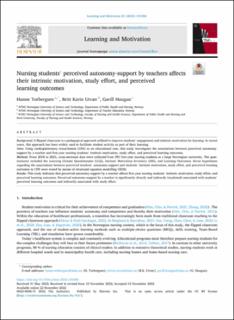Nursing students' perceived autonomy-support by teachers affects their intrinsic motivation, study effort, and perceived learning outcomes
Peer reviewed, Journal article
Published version
Permanent lenke
https://hdl.handle.net/11250/3064785Utgivelsesdato
2022Metadata
Vis full innførselSamlinger
Originalversjon
Torbergsen, H., Utvær, B. K. & Haugan, G. (2023). Nursing students' perceived autonomy-support by teachers affects their intrinsic motivation, study effort, and perceived learning outcomes. Learning and Motivation, 81, Article 101856. doi: 10.1016/j.lmot.2022.101856Sammendrag
Nursing students' perceived autonomy-support by teachers affects their intrinsic motivation, study effort, and learning outcomes”. Introduction: Intrinsic motivation among nursing students to achieve clinical competence and thus educational fulfillment is critical. In the Norwegian nursing context, the flipped classroom approach, and the use of student-active learning methods such as multiple-choice questions (MCQ), skills training, Team-Based Learning (TBL), and simulation have grown considerably. This study is based on a learning design using Cardiopulmonary resuscitation as a flipped classroom educational case. This includes both pre-class and in-class activities. Aims: The aim of this study is to investigate the associations between perceived autonomy-support by teachers and students’ intrinsic motivation, study effort, and perceived learning outcomes. Methods: In a cross-sectional design, quantitative data were collected from 401 nursing students at a large university in Norway. This study collected data on all first-year students between 2018-2021. The scales that were included was Intrinsic motivation inventory (IMI) and the Academic motivation scale (AMS) which is based on the tenets of Self- determination theory. Seven hypotheses of the associations between teacher relatedness, intrinsic motivation, study effort and learning were tested by means of structural equation modelling (SEM). Results: This study indicates that perceived autonomy-support by a teacher encourages first-year nursing students’ sense of autonomy, thus affecting their intrinsic motivation, study effort, and perceived learning outcomes. Perceived autonomy-support by a teacher is significantly associated both directly and indirectly (mediated) with students’ learning outcomes and indirectly associated with their study effort. Our findings suggest that in a course with a flipped classroom approach, teachers should guide students in their learning and provide them with choices to enhance their motivation for learning. By means of autonomy-supportive behavior, teachers may enhance students' motivation for learning as well as their study effort and learning outcomes.

